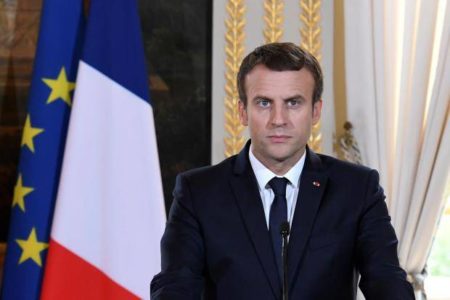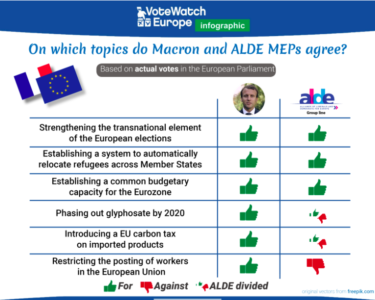Guaranteed to Blow Your Mind
Macron’s plans for EU politics

Source: The Independent
In the World before video-on-demand and online streaming, we used to watch shows and sitcoms on TV. One of the most popular shows was the British sitcom Only Fools and Horses. What fascinated viewers, besides the excellent humour, was the fact that the main characters led a day-to-day life with which people could easily associate. In the show, the main character would often repeat his phrase “He who dares, wins!” in order to reiterate his never-ending optimism on becoming a millionaire, despite being a small-time trader with shady business practices. It was a unique kind of optimism and belief.
To switch back from childhood nostalgia to European politics, if there is one person that glows with optimism, that would definitely be Emmanuel Macron. I have recently reminded myself about his successful bid for the presidency, by watching a documentary that followed his campaign. He relies heavily on advices from his wife and team, and his political gamble paid off with unique circumstances that would be unimaginable for anyone a year before the elections. It is important to keep in mind how the difference in the first round between first-placed Macron and fourth-placed Jean-Luc Mélenchon was less than five percent, with second-placed Marine Le Pen being unbearable to many and third-placed François Fillon being destroyed by scandals.
After conquering France, Emmanuel Macron has definitely set sights on the European Union. In accordance with his charisma, ambition and energy, last September he presented a plan for the EU at the Sorbonne University. However, despite proposing how Europe should look in the post-Brexit future, Macron did not elaborate his personal or party-political plans for the upcoming 2019 European elections. His party/movement La République En Marche! is composed of new faces in French politics, it is the most dominant force in the National Assembly, having an absolute majority, but is widely seen, especially to people outside France, as a tool to help Macron push his domestic reforms without any obstacles.
The policies of Emmanuel Macron have been so far defined as something that would be called radical centrism, combining pro-business policies with social liberal and pro-EU stances. He has strong support among the well-off voters, academia, etc., while polling low among the French working class. As a natural response, the centrist ALDE party/group was being very loud and happy to hear he was elected President of France, as they thought he would join their political family and significantly strengthen their presence in the Council and Parliament. However, it seems very clearly by now that Mr. Macron has some other plans.
The ALDE party boss Hans van Baalen recently announced on their party conference in Amsterdam that they will gain additional seats in the Parliament and that Macron’s party will be a part of their alliance. It was not quite a convincing message, having in mind that there were no representatives of Macron’s party in the audience. The ALDE party/group as such is very heterogeneous, ranging from syncretic movements with populist tendencies (Czech ANO or Slovenian DeSUS), to social liberals (Dutch D66 or Croatian IDS) and national liberals (German FDP or Dutch VVD). Also, as Vote Watch shows in their graphic, Macron’s proposals are in conflict with certain parts of ALDE, as Macron is not so openly free market as laics would observe, retaining certain reserves, which makes sense having in mind the French economic tradition and his left-wing (pre-banker) history.

Source: VoteWatch Europe
A bizarre example recently occurred within the S&D group, where French MEP Gilles Pargneaux, probably trying to save his own skin, claimed that he gathered 70 MEPs from different political groups that are establishing a non-formal pro-Macron alliance. The whole thing turned out to be a hoax, despite the relevant EU news sources picking up the story. However, it also shows the possible splits within the S&D group, where a sense of heterogeneity is clearly visible, with centrist and leftist tendencies constantly colliding. Regarding the EPP, some of their members are already in the Macron government, with Prime Minister Édouard Philippe coming from the French Les Républicains, who are now struggling to make a policy distinction between Macron and Le Pen.
So what is basically Emmanuel Macron’s plan for next year? It seems that he is trying to copy his French political success onto the European level. That would include forming his own pan-European political group, while trying to disrupt the current status quo of the mainstream EU political groups. His strong ambition, combined with his distance towards the existing political forces, which he views as products of previous times, could led other groups splitting into pragmatists and populists. His possible group would then be attractive for moderate liberal conservatives, as well as to social liberals, centrist social democrats and even some pragmatic parts of the greens. That way, he would have under the umbrella strongly likeminded pro-EU forces.
Although it is unnatural to have Angela Merkel and Viktor Orban in the same political group, splitting or destroying the current system would lead to possible dangerous outcomes, as then we would switch the traditional political cleavages into a battle of pro-EU and globalist forces versus the Eurosceptic and anti-EU populists. On the long run, that is very problematic for democracy. Will that work in the next year’s European elections? It remains to be seen. Europe is much more complex than France and already in many countries his ideas are not welcomed with enthusiasm. If Macron fails, it could turn out to be a very big blow for his presidency in France, and would significantly compromise his political charisma, much in the way we nowadays view Angela Merkel and her coalition-forming struggles.
